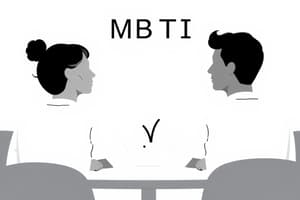Podcast
Questions and Answers
Match the personality types with their main characteristics:
Match the personality types with their main characteristics:
ENFP = Enthusiastic, creative, and good at giving support ENTP = Innovative, outspoken, and idea-oriented ESTJ = Responsible, practical, and assertive ESFJ = Warmhearted, conscientious, and community-focused
Match the personality types with their preferred environments:
Match the personality types with their preferred environments:
ENFP = Enjoys new environments and hands-on experiences ENTP = Engages in debates and enjoys variety ESTJ = Focuses on achieving efficient results ESFJ = Thrives on providing care and appreciation
Match the personality types with their leadership styles:
Match the personality types with their leadership styles:
ENFJ = Facilitates agreement among diverse groups ENTJ = Strong leaders with a focus on organization ESTJ = Takes charge with clear standards and rules ENFP = Encourages others with creativity and enthusiasm
Match the personality types with their struggles:
Match the personality types with their struggles:
Match the personality types with their focus areas:
Match the personality types with their focus areas:
Match the personality types with who they are best known for assisting:
Match the personality types with who they are best known for assisting:
Match the personality types with their emotional intelligence levels:
Match the personality types with their emotional intelligence levels:
Match the personality types with their entrepreneurial tendencies:
Match the personality types with their entrepreneurial tendencies:
Match the following personality types with their primary characteristics:
Match the following personality types with their primary characteristics:
Match the MBTI dichotomies with their descriptions:
Match the MBTI dichotomies with their descriptions:
Match the following personality types with their main focus:
Match the following personality types with their main focus:
Match the MBTI cognitive functions with their associated decision-making style:
Match the MBTI cognitive functions with their associated decision-making style:
Match the following personality types with their preferred social interaction:
Match the following personality types with their preferred social interaction:
Match the following terms with their descriptions:
Match the following terms with their descriptions:
Match the following personality type preferences with their key characteristics:
Match the following personality type preferences with their key characteristics:
Match the personality type with its main traits:
Match the personality type with its main traits:
Match the following MBTI descriptors with their correct functions:
Match the following MBTI descriptors with their correct functions:
Match the following statements with the MBTI preferences they describe:
Match the following statements with the MBTI preferences they describe:
Match the following personality types with their work style:
Match the following personality types with their work style:
Match the personality types with their strengths:
Match the personality types with their strengths:
Match the following MBTI types with their decision criteria:
Match the following MBTI types with their decision criteria:
Match the MBTI preferences with their typical behaviors in groups:
Match the MBTI preferences with their typical behaviors in groups:
Match the following MBTI personality types with their characteristics:
Match the following MBTI personality types with their characteristics:
Match the following descriptions with the corresponding MBTI functions:
Match the following descriptions with the corresponding MBTI functions:
Match the personality type with its typical demeanor:
Match the personality type with its typical demeanor:
Flashcards are hidden until you start studying
Study Notes
Introduction to MBTI
- Developed by Isabel Briggs Myers and Katharine Cook Briggs in 1942.
- Serves as an introspective self-report evaluation identifying personality types and psychological preferences.
- Aims to enhance understanding of how individuals process information and make decisions.
Cognitive Functions
- Four dichotomies define personality types:
- Extraversion (E) vs. Introversion (I): Focus on outer vs. inner world; extraverts gain energy from social interactions while introverts recharge alone.
- Sensing (S) vs. Intuition (N): Preference for concrete information vs. abstract interpretation; sensing types focus on details, intuition types on patterns.
- Thinking (T) vs. Feeling (F): Decision-making through logic and facts vs. emotions and personal circumstances.
- Judging (J) vs. Perceiving (P): Preference for structure and decisiveness vs. flexibility and openness to new information.
16 Personality Types
- ISTJ – The Logistician: Orderly, responsible, detail-oriented, values tradition and laws.
- ISFJ – The Defender: Friendly, service-oriented, loyal, values harmony and care for others.
- INFJ – The Advocate: Serious, compassionate, values deep connections, needs personal time.
- INTJ – The Architect: Independent, analytical, logical, perfectionist with high expectations.
- ISTP – The Crafter: Fearless, adventure-seeking, results-oriented, pragmatic problem solvers.
- ISFP – The Artist: Easy-going, sensitive, values deep connections, prefers smaller social circles.
- INFP – The Mediator: Idealistic, loyal, family-oriented, seeks to understand and serve humanity.
- INTP – The Thinker: Analytical, problem-solving focus, values ideas over social interaction.
- ESTP – The Persuader: Action-oriented, charming, spontaneous, enjoys practical experiences.
- ESFP – The Entertainer: Outgoing, impulsive, seeks fun experiences, learns through hands-on activities.
- ENFP – The Champion: Enthusiastic, creative, values appreciation, dislikes routine.
- ENTP – The Debater: Innovative, lively, engages in discussions, strong conversational skills.
- ESTJ – The Director: Practical, assertive, values efficiency and tradition, focused on results.
- ESFJ – The Caregiver: Warm, caring, values appreciation, excels in community involvement.
- ENFJ – The Protagonist: Responsible, empathetic, enjoys helping others grow, good leader.
- ENTJ – The Commander: Takes charge, values organization, strong leadership and people skills.
Online Tool
- Free personality test available online at 16personalities.com.
Studying That Suits You
Use AI to generate personalized quizzes and flashcards to suit your learning preferences.




